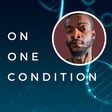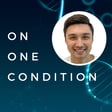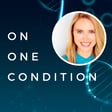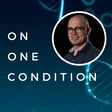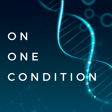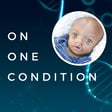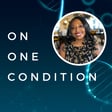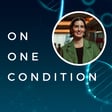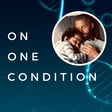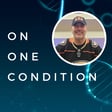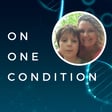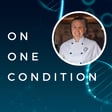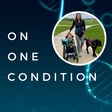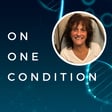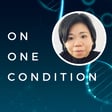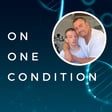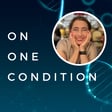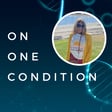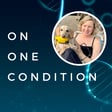Become a Creator today!Start creating today - Share your story with the world!
Start for free
00:00:00
00:00:01

Episode 47: Erin Paterson - Huntington's Disease
Erin opens up about discovering Huntington's disease in her family when she was in her early 30s. She talks about her father and how his outbursts and behavioral changes, often misunderstood, were early signs of the disease. Erin reflects on her own diagnosis, the emotional burden of being gene-positive, and the delicate task of caregiving while also being a mother. We also talk about Erin’s passion for writing and storytelling, particularly her books, which focus on HD, rare diseases, and patient advocacy. She emphasizes the power of storytelling in the HD community, giving a voice to patients, caregivers, and families.
The song that Erin selected is Yer Fall by Hey Rosetta.
Transcript
Introduction to 'On One Condition' and Erin Patterson
00:00:00
Speaker
Hi, I'm Sylvain Bertolo, and you're listening to On One Condition, a podcast to raise awareness about health conditions by listening to people who live them every day. My guest today is Erin Patterson, and we're going to talk about Huntington's disease. Hi, Erin. Thanks for joining me on the podcast. How are you doing? I'm good. Thanks for having me. I really appreciate being here today.
00:00:25
Speaker
Well, I appreciate you joining. So I love starting with a song. So could you tell me which song you chose and why, please? ah My song is Your Fall. It's spelled Y-E-R, Fall, by Hey Rosetta. Okay. Why did you did you choose that song? What's the meaningfulness for you?
00:00:46
Speaker
I would say that it's my favourite song of all time and it's one I listen to if I need to pick me up or if I'm in a good mood and I just want to wail away to the song. um It starts out really, really slowly and then builds and um at the end you just like feel really energised and um the singer, his name is Tim Baker, has an amazing voice and I just really love listening to it and all of his music is like poetry.
00:01:14
Speaker
Okay, nice. I don't know the song, so you really made me want to listen to it. Yes, you're going to have to. It's a Canadian indie rock band from Newfoundland, so not a lot of people, I guess, outside of Canada maybe have heard of them. Okay, nice.
Erin's Personal Connection to Huntington's Disease
00:01:30
Speaker
So today we're talking about Huntington's disease, which a lot of people also know as HD. We already talked about HD on the podcast, but it was more from a personal point of view by someone who was positive but wasn't showing symptoms yet. But today we're going to talk a bit more about your dad and the caregiving side of things as well. That's right. Yeah.
00:02:00
Speaker
So starting with the beginning, I guess, when did your dad start showing symptoms and when did you know that it was Huntington's?
00:02:13
Speaker
Well, I didn't really know about Huntington's disease running in my family, uh, until I was 31 years old. And my husband and I, we'd been married for almost 10 years at that point. And we decided we wanted to start our family. So we had started trying to conceive and we thought my parents would be excited to know that they are probably going to be grandparents in the next year. So, um, at brunch one day we told them, Hey, we're trying to have kids. You're going to be grandparents. Yay. This is so exciting. And they weren't excited.
00:02:42
Speaker
And we're really upset ah because we didn't understand their reaction because ah my mom, she had a daycare in our house growing up and instead of playing with my friends, I would go home and play with the babies after school all the way up until grade eight. I just love babies so much. So I thought of any of the kids, she knew that I wanted to have children of my own because I love kids so much.
00:03:05
Speaker
And it was a couple of days later that they told us their suspicions that Huntington's disease might run in our family. And the reason we say might is because my grandmother passed away before the gene was discovered. So they didn't know for sure.
00:03:19
Speaker
So that set me on a trek to find out if I was gene positive or gene negative because I was had i was already in the process of having kids and there's, with each kid you have, there's a 50-50 chance that you could pass the disease on to them. So it felt like something I should probably know before we move forward with having kids. So I found out about Huntington's disease in my family and I went through genetic testing and eight months later I tested gene positive for the disease.
00:03:46
Speaker
and okay So that that's how it was introduced to talk to my life. um The moment I tested gene positive, I also realized, oh gosh, well, that means my dad has it too. And um there was a period of time where I had to keep that horrible secret because going through genetic testing is a very personal choice and I didn't want to force my dad into into testing. um But since I had it, it was 100% sure he had it. So about a month after that, I found out he had gone through testing as well.
00:04:16
Speaker
and he knew that he was gene positive. So um we could talk about it at that point. okay So he still wasn't showing any symptoms. um I would say he probably didn't start showing any symptoms until he was in his fifties.
Symptoms and Adaptations in Caregiving
00:04:30
Speaker
He has late onset Huntington's disease. um Most people start to get Huntington's disease in their thirties and forties and they pass away in their fifties and sixties.
00:04:40
Speaker
Fortunately in our family, um my dad, he started getting symptoms in his late fifties and he is now 81 years old. And when I people when i tell people he's 81 years old, they're always amazed and say, oh my gosh, how did he make it that far? They're super excited to talk to me about my dad a lot of the time. So that's ah obviously not not positive, but it's good that he's reached that age.
00:05:08
Speaker
h What was it like when he showed the first symptoms? Sometimes you're not diagnosed with Huntington's disease until you're showing symptoms of Korea, which is the shaky movements, but actually symptoms start 10 to 20 years before that. So there was a lot of um emotional outbursts and unusual behavior from my dad that we didn't understand. ah this This was behavior that started before we even knew he was gene positive. okay He got in a fist fight with somebody.
00:05:40
Speaker
ah but over a parking spot. That was not my dad. He lost his job for an outburst and that was not my dad. So we didn't know what was going on, so that was a very confusing time. And I would say it's only in the last 10 years that um he's had the noticeable Korea.
00:06:00
Speaker
And so how did you how did he manage met then those those old bursts? Because I mean, when it's inside the family, I would imagine it's difficult, but it doesn't have as many consequences as getting in a fight or or being fired. I mean, we didn't know what it was. So we just did our best to understand and be supportive. ah But that was hard when we didn't understand what it was.
00:06:28
Speaker
I would say after he was diagnosed as gene positive and things like that would happen in the beginning stages of HD, we learned how to um speak to my dad in a way that wouldn't cause an outburst. You know, there was always some triggering subjects for him. So we would avoid those subjects. Or if one of those subjects did come up, then we would just agree with everything he said and just, just let them talk it out. And we'd just agree with everything in the beginning, you know, he, he would do things like he would call me. And anytime we had a phone call, I just had to be on the call for half an hour. There was no getting off of it.
00:07:10
Speaker
ah And sometimes he would call me every day, five days in a row, and we'd have the same discussion every single day because he he just got stuck on an idea um and had to keep talking about it until he got it out of his system, I guess. So that was very challenging. It was hard to deal with those things because at the time I had a two-year-old daughter And even if I said, you know, dad, I'm sick right now, I can't really talk. ah that He just needed to talk. ah it It's not that he didn't care about us, it's just that he just really needed to get that out, needed to discuss it. Yeah, yeah. Does he have other symptoms now?
00:07:52
Speaker
Yeah. So now he, um, he's still able to walk with a Walker, which is really great. And he's still able to eat by himself, but pretty much everything else he needs help with now. So, uh, we have a personal support worker who goes and helps him get dressed in the morning and get ready for the day and who goes back at nighttime and helps him get ready for the nighttime and, uh, make sure, you know, take them on a walk and things like that. And if he's feeling tired, we have a wheelchair for backup that he could use.
00:08:21
Speaker
And he he just needs help being reminded to do things like brush his hair and brush his teeth. he He can't really make phone calls anymore. He can't really make eye contact all of the time, especially if he's feeling sick. It's harder for him to like look up and look at you. And he says only one or two words at a time.
00:08:44
Speaker
um you know, most of the time when I ask him a question or say something to him, his reply is very good. Uh, but it takes a long time for that answer to come out and you could sometimes see him scrunching his head up to try and say, very good. Right. And if he says three sentences in a row, sometimes you're like, Oh, well that was really great. Like I just got a piece of my dad back. Like he had that like lucid moment where he was able to tell me a lot of things.
00:09:11
Speaker
ah but that doesn't happen very often. And when I speak to him, I ask him one question and then I wait and I wait and I wait for his answer. And usually takes 30 to 60 seconds for an answer to come. And then I can ask him another question. So it's not like you can have a normal back and forth quick conversation with him. yeah We just have to always, ah it's it's just a very slow paced conversation.
00:09:38
Speaker
Okay. And is he conscious? that Yes, he's fully aware. He's fully aware of everything that's going on around him. It's just kind of like he's trapped in his body and he's not really able to advocate for himself all that well. he he can you know One time there was an issue, we had a bed rail on the side of his bed and he got stuck in it and I had to go and help him get out. And then he walked over to it and angrily just shook the bed rail, right? So that's how he's communicating. And I said, oh, do you not want that on there anymore, dad? And he's like, no. So then I took it off for him. So he, he is able to communicate and in some ways, but if something happens to him, he's not able to call me and say, this happened to me.
00:10:26
Speaker
Yeah. If something happens to him and I'll find out through word of mouth through somebody else months later, ah he he would never have told me that that happened to him. And there have, there have been a few cases where he's been verbally assaulted and he's never told me about it. And I find out through a care worker, uh, who pulls me aside in the hallway when I go to visit him and says, you know, I saw this person and they weren't treating him very nicely. I just wanted to let you know.
00:10:55
Speaker
So that that can be really challenging to deal with. Yeah. yeah and is he Does he get frustrated with himself? If like if it takes long for him to to reply or does he not have time? He seems like a pretty happy guy now. Like I say, he seems happier now in the last three years than he has previous to that. like He seems pretty chill these days. and um you know Sometimes he does have angry outbursts still, but it's usually if somebody's not treating him properly or doing something without asking permission. because Just because it takes him a long time to answer a question doesn't mean he doesn't have the right to answer a question. so If you just walk into his room and start doing stuff and moving his things around, of course he's going to get mad.
00:11:43
Speaker
Yeah. ah Do you have to imagine change the way you ask questions so that it's easy for him to answer them? Yes, 100%. You have to ask questions that have a yes or no answer. And then sometimes he just doesn't answer and then you just think, okay, how could I rephrase this? as Maybe he doesn't understand what I'm asking. How could I say it in a different way? Yeah. How hard was it from your point of view to adapt?
00:12:12
Speaker
for for me to adapt or for him to adapt? For you. I don't think it's hard for me to adapt because I'm just changing my behavior to help make him successful. And I respect my dad and I i think he deserves to have a say in his medical care and what happens to him. So I'm never going to just do something without trying to talk to him about it or having a discussion with him about it.
00:12:40
Speaker
I teach my daughter about it a lot. My husband and I talk to her a lot. She is an expert at dealing with people with Huntington's disease. She's better than some adults and she's better than some medical professionals at understanding, hey, grandpa just needs a little bit of time to answer or you know and grandpa needs a little bit of help ah walking down that slope or grandpa needs, you know you just you just have to wait. she's She's just really learned how to be patient.
00:13:09
Speaker
um and understanding of ah why he doesn't act the same as everybody else. Yeah, yeah. And it's not an experience, like for I'm thinking about your daughter, not an experience that you wish on anyone, obviously, but at the same time, growing up with such awareness that others have different needs must be valuable. And I'm sure she's going to grow
00:13:41
Speaker
to to be a a wonderful person knowing that and and appreciating that. Thank you. And I know that I'm teaching her as well how she's going to have to treat me one day. Yeah. Yeah, because that's my future as well. So how do you feel about that? um That's probably the single hardest thing about all of this is this time where I have to
Challenges in Healthcare and Family Impact
00:14:05
Speaker
take care of my dad and everything I do triggers me.
00:14:11
Speaker
Right? Every single thing, every interaction with my dad, every phone call I have to make on his behalf or every call from the care home ah is a trigger for me. thinking, oh my gosh, this is my future. My daughter is going to have to do this for me one day. And it's it's really, a really difficult to think about those things. And I have to focus a lot on self-care and how to manage those triggers and you know even realize, oh, that is a trigger for me. And if there's something my husband can do like ordering my dad something off Amazon, then I say to my husband, here, can you take this over, please? Or
00:14:47
Speaker
could you make this phone call for me or I'll call my brother and ask him. ah Somebody called me about such and such, could you please deal with this today? Because it's too hard for me. So I think that's the single hardest thing about this whole Huntington's disease. Yes, and and it relates to a discussion we had on on the podcast when when we talked about it before. ah ah Yeah, I can free imagine how difficult it it must be.
00:15:16
Speaker
How is the support you're getting for your dad? Is it something that was easy to get? And does it fully support him and and you as his family? I would say because he lives in a small town, it was easier to get in the small town than it has been in the big town. um My mother-in-law also needed some supports at the end of her life and it's not as available in the big town of Toronto as it is in a smaller town. So even though it was easier to get the services in, ah the problem is they're not at all reliable.
00:15:50
Speaker
And currently I have three different organizations that are helping care for my dad, but none of them talk to each other. And when something is wrong, a lot of times they don't even talk to me. So I'm very angry about that right now. It's really hard to navigate. um You know, my dad was being neglected by one of the care agencies because they just wouldn't show up and they don't have any backup people.
00:16:19
Speaker
So if you don't show up to help my dad dad get dressed in the morning, then he's in his pajamas all day. That's not fair. And um so he was being neglected. And every time I lived two hours away from him. And so I only go up every three weeks. It's a long way there and back. And when I was going up, I felt like I felt like something was wrong, but I couldn't quite tell. And then six months later, I found out there was actually an investigation into my dad's and neglect and nobody had even informed me.
00:16:50
Speaker
And then when I called the organization who performed the investigation, they couldn't tell me anything about it. And I'm my dad's power of attorney. I have his medical power of attorney. um But there's a lot of things in Canada that are set up to protect the patient, to protect my dad. And a lot of them have to do with privacy. But the problem is,
00:17:12
Speaker
They're protecting my dad's privacy, but they're actually harming his well-being, his physical well-being, because so many people won't reach out and talk to me about my dad because of the privacy issues.
00:17:26
Speaker
pretty well yeah Yeah, it's very frustrating. How an attorney should give you access to everything? usually You would think, um but it depends on how a person interprets something. There was one instance where my dad was sent home from the emergency department with a catheter and no instructions on what to do next. And I tried to call the hospital to say, like is there did you issue a nurse a nurse to come out to take care of this? And the doctor wouldn't talk to me. And he said,
00:17:56
Speaker
A power of attorney was for when he's dead. I'm like, that doesn't make any sense. And he said, your dad was ah cognitively aware, and he's able to make decisions for himself, so I can't talk to you. And I said, that might be the case, but he also can't pick up the phone and call and tell me what happened to him.
00:18:14
Speaker
So he can't get any follow-up care that you're requiring without my help because I'm the one who books all of the doctor's appointments and arranges for the transportation to get him there, which most of the time is me driving up two hours and taking him to a doctor's appointment. um So I've encountered a lot of situations like that and I've elevated it to the management of the hospital up there and ah somebody actually told me I should get my dad declared incompetent. And I'm like, but he's not incompetent.
00:18:42
Speaker
like He is aware. like Doesn't that seem like that would be illegal to get him declared incompetent if he's not? so they I'm in this gray area where he is cognitively aware, but he can't speak. and there's There's nothing set up in the system for that situation, it seems. so It's still something I'm trying to figure out.
00:19:05
Speaker
He meets certain criteria, but not others. And therefore he doesn't get all the the extent of the support he could get. for yes yeah And do the support workers understand HD or are they trained on HD? No. And some people treat him very badly. And then I have to, once I hear about it through the grapevine, make sure that that person's not caring for my dad anymore.
00:19:36
Speaker
Uh, the people who come in through the government, they're not always consistent. So even if you do educate those people, you know, the next week it could be somebody different. So I actually have signs hanging up all over his room, uh, with it, like I had a communication profile done at the hospital and it says the five things about him, you know, uh, ask rant before you do anything for him.
00:20:01
Speaker
ah yeah Ask yes or no questions. Always do this, you know, so there's like five important points and I have one posted on the mirror in the bathroom and on the fridge and on the back of the door, hoping that they could see it at some point when they're helping my dad. And because the services from the government fall short a lot of the time and people don't show up, I also have a personal support worker that I hired that goes in for two hours a day, one hour in the morning and one hour at night.
00:20:30
Speaker
and Her company is very small. There's just like five or six employees. I educated them about HD, and they are very good about dealing with my dad. They get it. Yeah. It's incredible how you need someone you can trust, and usually that comes from a smaller team, someone you can talk to directly and you know that person owns the responsibility you're giving them. Yeah. Yeah. Yeah. It's made a huge difference.
00:20:59
Speaker
um It's only been recently in the last year that we've had them, so it's been very helpful. Well, it's very interesting to to hear you talk about your dad because, like I said, the the other time we talked about the the future of someone who's positive, gene positive, but not really about the the caregiving side. It must take a lot of your time, I imagine. It does.
00:21:31
Speaker
It's exhausting. I burn myself out a lot, especially when my dad ends up in a hospital and then um he's two hours away. So two years ago, he ended up in hospital.
00:21:43
Speaker
Cause he had myocarditis from the COVID vaccine. ah They didn't know it. And he was in hospital for three months and I would spend, I would drive up on Wednesday morning and be there Wednesday, Thursday, Friday and Saturday. And then I'd come home Saturday evening and spend a few days with my family and then go back up. ah So I was away from home a lot. And at that time it was still COVID. So only one person was allowed to visit my dad in the hospital and that was me.
00:22:12
Speaker
And there was a lot of misunderstandings in the hospital. you know They thought he was there because of his Huntington's. And I would say, well, but he was just walking and talking and eating yesterday. You don't go from walking and talking and eating one day to being paralyzed and you know not conscious the next day. So it's something else. And I said, I think it's the COVID vaccine. And they just kept investigating and investigating. And every time somebody came into his room,
00:22:39
Speaker
whether it was like ah a speech person or a nurse or a doctor, every single person, I talked to them about Huntington's disease and said, this is not Huntington's disease. I think it's the vaccine. And after five days they discovered, Oh yeah, it was the vaccine. Um, and there was another instance when my dad was starting to get better and I had a discussion with one of the nurses in the hall and she said, you know, I was talking to your dad and he,
00:23:04
Speaker
I said, do they feed you where you live? And he said, yes. So then every day she was spoon feeding him, right? Cause she thought that was his baseline. And I said, no, no, no. Oh, what he meant was they cook for him.
00:23:17
Speaker
he didn't mean they spoon feed him every day. He's able to eat by himself. So let's get him back to that. But so then her baseline was like, Oh, he spoon fed every day. It's like, no, no, the baseline is he feeds himself. So let's get him back to feeding himself. And so there are a lot of things like that, uh, that I've had to advocate for my dad. Wow.
00:23:39
Speaker
Well, I'd like to change topics slightly, although I know it's still ah staying on on Huntington's, at least at the beginning.
Erin's Advocacy Through Writing
00:23:48
Speaker
but We got in touch because you do a wonderful thing ah writing patient autocracy books. So I'd love to talk to to you about that.
00:24:01
Speaker
But starting with why, or like what made you want to write those books? My family is very secretive about Huntington's disease. And even after I tested gene positive, nobody wanted to talk about it. okay And you know in the beginning, it even got to the point where I started noticing symptoms in my dad. And because nobody wanted to talk to me about it, I thought I must be imagining them. And After 10 years of keeping my diagnosis a secret, I just thought, I don't want to do that anymore. There's got to be a better way to live life than feeling full of shame because of this thing that I did nothing to deserve. And it's just going to happen to me because of my genetics. And I thought there's got to be a better way. And I decided to start writing about my experiences.
00:24:54
Speaker
I hired a writing coach and I wrote my first book, which is called All Good Things. And it's about finding out Huntington's ran in my family and how that impacted our decision to have children. And it's about how we ended up being the parents to our daughter. um And it was a very emotional process for me, but it was also very cathartic and healing. And once I put my book up for sale on Amazon, I felt like, okay, well now everybody knows and I don't have to hide anything anymore.
00:25:25
Speaker
And I started becoming a part of the Huntington's community, which I hadn't really been a part of before. i I had been avoiding getting involved with the Huntington's community because I was too afraid. And now Huntington's disease is just a part of my life and I could talk about it without crying. And I could talk about it without all of the fear and shame that I had before. So I thought, wouldn't it be great to help other people do the same thing? Because I'm sure other families are just as secretive as my And I didn't think, I wasn't sure when I started the project, if anybody would be interested in sharing their stories publicly. So I just started tentatively reaching out to people saying, Hey, this is what I'm thinking of doing. Do you want to be involved? And I had so many people interested. I spoke to over 135 people. And that was just from word of mouth and posting on a couple of Facebook groups. And we ended up with 26 people from nine different countries.
00:26:23
Speaker
who are all sharing their stories in that book called Huntington's Disease Heroes. And we have all people from different perspectives. So, you know, there's somebody who's gene positive. There's somebody who's gene negative. There's somebody who decided, I'm just going to have kids naturally to another person who decided they're going to go through in vitro fertilization with genetic testing on the embryos. There is a young caregiver who ended up being a caregiver for her father when she was a teenager.
00:26:52
Speaker
And then there's another woman who has cared for three generations of people with HD in her family. Um, it was her father-in-law who passed away from Huntington's disease. And then her husband passed away from Huntington's disease. And shortly after that, she found out her daughter had juvenile Huntington's disease. So she spent her entire life caring for people with Huntington's disease. So we just, and I have a couple of scientists who wrote stories in there as well, and they're at risk for HD.
00:27:19
Speaker
or their gene positive for HD and they're trying to find a cure. So some really great stories from a varied um different perspectives within the community, which is important. Yes. And and the ah you mentioned people who are gene negative. Yeah. Their point of view is very interesting as well because they are part of this Huntington's disease community, but then testing gene negative has kind of a an impact on their mental health or can because they feel like they shouldn't be part of of the community anymore. Yeah. Yeah. They have survivor's guilt or where do they fit into the community? And yeah they're still there being caregivers because it's rampant in families. There's a lot of HD in families. So even if you chip even if you test gene negative, it's still within your life.
00:28:16
Speaker
ya yeah yeah Yeah, we had one young man who was afraid of testing but ah gene negative. you know And I was like, what? and why How is that possible? Why are you afraid of not having it? I don't understand. And then he wrote that in his story and basically it's like he lived his entire life surrounded by people with Huntington's disease and that's all he could imagine for his future. And the idea of testing negative and having this whole entire future ahead of him He didn't know what to do with that. yeah I read that book. It's an incredible book. Thank you. It shows that every single person approaches, in this example, Huntington's disease differently. I think you can generalize that to any health condition. It really is depending on your bringing and and your mindset and and how people around you are supporting you as well.
00:29:15
Speaker
Yeah. And I think the important thing that I learned from the project really is um no matter what decision a person makes, whether it's around having kids or going through genetic testing or what they want their future to look like is is the right decision. Like we all make different decisions based on our unique set of circumstances. And I really beat myself up when I was trying to have kids and trying to make the right moral choice. And I've since learned, well, there is no right moral choice. They're all good choices. yeah But I really struggled ah and put myself through a lot during that time. imagine yeah
00:29:55
Speaker
And now you've got a new book. Yes. and So you you won't stop. No, I'm going to keep going because there's so many people out there with unshared stories that deserve to have a voice. Yeah. yeah The next book is called Positively Rare. And we have 21 stories from people across the UK, Canada and the United States. And each of them are living life with a different rare disease.
00:30:21
Speaker
um And a lot of times if you have one rare disease, you have more than one rare disease. So there is a little bit of overlap in some of the rare diseases, but um we have people who are parents to kids with rare diseases and adults who are living with rare diseases telling their stories.
00:30:37
Speaker
Yeah. And I was lucky enough to read the a few of the chapters and it it was very, very moving. Thank you. The stories, I like the fact that they're moments in time, they're not necessarily explaining the the symptoms or the impact, but really moments in time and yeah they're very personal. say yeah I can't wait to read the rest. Oh, thank you.
00:31:11
Speaker
I would say that um most people who came to the project had gone through something and they just really felt this urge to share it with people. And a lot of the time it's so that other people who are coming up behind them don't have to go through the same things or they don't have to suffer as much. And that's really what motivates a lot of people to share.
00:31:31
Speaker
And you know it's not just about going through a diagnosis journey. um Those are important, but all of the stories aren't diagnosis journeys. um yeah Like you said, sometimes it's just a moment in time. This was one day and this is how I got through that one day, or this was one week and this is how I got through that one week. ah Because when we're in the midst of living our life with this rare disease and it can be very isolating and alone, sometimes we need to just get through the next moment.
00:31:59
Speaker
And we can't always think about things way into the future. So I think they're very powerful that way. I encourage everyone to read those books. um It's a like listening to podcasts is one thing, but and reading books, you get a different side ah of things again. So it's great. Thank you. And if I'm not wrong, your daughter's writing a book as well.
00:32:26
Speaker
She is! It's coming out next month! She wrote a book called Bloopy the Alien Learns About Huntington's Disease. And we're turning, it was um in the Huntington's disease hero book, and we're turning it into a kid's picture book. So it's almost done. And we're going to have a little book launch for her, but she's very excited. And it's all about an alien who comes to earth and meets Emma's grandpa and wonders why he's behaving in such a strange way, not the same as everybody else. And it's ah about Emma teaching the alien. This is my grandpa. He has Huntington's disease. This is the the the reason he behaves this way.
00:33:01
Speaker
And here's how you should treat him or here's how you should handle him. So it's just a a little story to teach kids about differences. And it is about Huntington's disease, but it can apply to anything really. Yeah, that's great. on a She's very excited for it to come out.
00:33:20
Speaker
ah Yeah, I bet.
Conclusion and Future Work
00:33:22
Speaker
Well, Erin, I've loved talking to you. Knowing that your dad is in his 80s is incredible and so great. And knowing that he's got you next to him, um I'm sure he's very grateful for that. Thank you. All the support you give him.
00:33:43
Speaker
I can't wait to read positively rare. I'm sure that the other chapters that I haven't read yet are going to be as good as as the ones I've read. And thank you for doing that work and and giving others a voice as well. Thank you very much.
